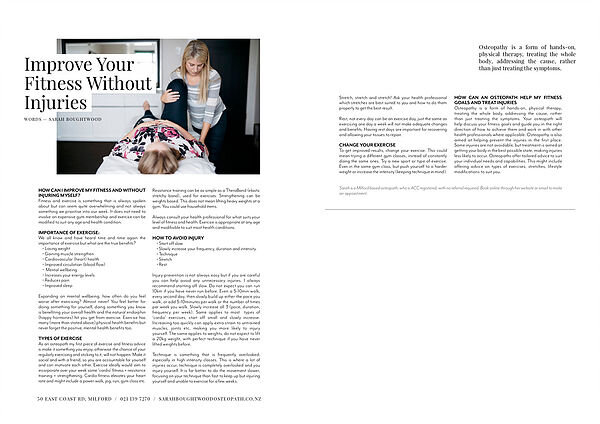Verve Magazine - How to improve your fitness without injuring yourself
Fitness and exercise is something that is always spoken about but can seem quite overwhelming and not always something we prioritise into our week. It does not need to involve an expensive gym membership and exercise can be modified to suit any age and health condition.
Importance of exercise:
We all know and have heard time and time again the importance of exercise but what are the true benefits?Losing weightGaining muscle strengthenCardiovascular (heart) healthImproved circulation (blood flow)Mental wellbeingIncreases your energy levelsReduces painImproved sleep Expanding on mental wellbeing, how often do you feel worse after exercising? Almost never! You feel better for doing something for yourself, doing something you know is benefiting your overall health and the natural endorphin (happy hormones) hit you get from exercise. Exercise has many (more than stated above) physical health benefits but never forget the positive, mental health benefits too.
Types of exercise
As an osteopath my first piece of exercise and fitness advice is make it something you enjoy, otherwise the chance of your regularly exercising and sticking to it, will not happen. Make it social and with a friend, so you are accountable for yourself and can motivate each other. Exercise ideally would aim to incorporate over your week some ‘cardio’ fitness + resistance training + strengthening. Cardio fitness elevates your heart rate and might include a power walk, jog, run, gym class etc. Resistance training can be as simple as a TheraBand (elastic stretchy band), used for exercises. Strengthening can be weights based. This does not mean lifting heavy weights at a gym. You could use household items. Always consult your health professional for what suits your level of fitness and health. Exercise is appropriate at any age and modifiable to suit most health conditions.
How to avoid injury
Start off slowSlowly increase your frequency, duration and intensityTechniqueStretchRestInjury prevention is not always easy but if you are careful you can help avoid any unnecessary injuries. I always recommend starting off slow. Do not expect you can run 10km if you have never run before. Even a 5-10min walk, every second day, then slowly build up either the pace you walk, or add 5-10minutes per walk or the number of times per week you walk. Slowly increase all 3 (pace, duration, frequency per week). Same applies to most types of ‘cardio’ exercises, start off small and slowly increase. Increasing too quickly can apply extra strain to untrained muscles, joints etc, making you more likely to injury yourself. The same applies to weights, do not expect to lift a 20kg weight, with perfect technique if you have never lifted weights before. Technique is something that is frequently overlooked, especially in high intensity classes. This is where a lot of injuries occur, technique is completely overlooked and you injury yourself. It is far better to do the movement slower, focusing on your technique than fast to keep up but injuring yourself and unable to exercise for a few weeks. Stretch, stretch and stretch! Ask your health professional which stretches are best suited to you and how to do them properly to get the best result. Rest, not every day can be an exercise day, just the same as exercising one day a week will not make adequate changes and benefits. Having rest days are important for recovering and allowing your tissues to repair. Change your exerciseTo get improved results, change your exercise. This could mean trying a different gym classes, instead of constantly doing the same ones. Try a new sport or type of exercise. Even in the same gym class, but push yourself to a harder weight or increase the intensity (keeping technique in mind).
How can an osteopath help my fitness goals and treat injuries
Osteopathy is a form of hands-on, physical therapy, treating the whole body, addressing the cause, rather than just treating the symptoms. Your osteopath will help discuss your fitness goals and guide you in the right direction of how to achieve them and work in with other health professionals where applicable. Osteopathy is also aimed at helping prevent the injuries in the first place. Some injuries are not avoidable, but treatment is aimed at getting your body in the best possible state, making injuries less likely to occur. Osteopaths offer tailored advice to suit your individual needs and capabilities. This might include offering advice on types of exercises, stretches, lifestyle modifications to suit you.
Sarah is a Milford based osteopath, who is ACC registered, with no referral required. Book online through her website or email to make an appointment.

